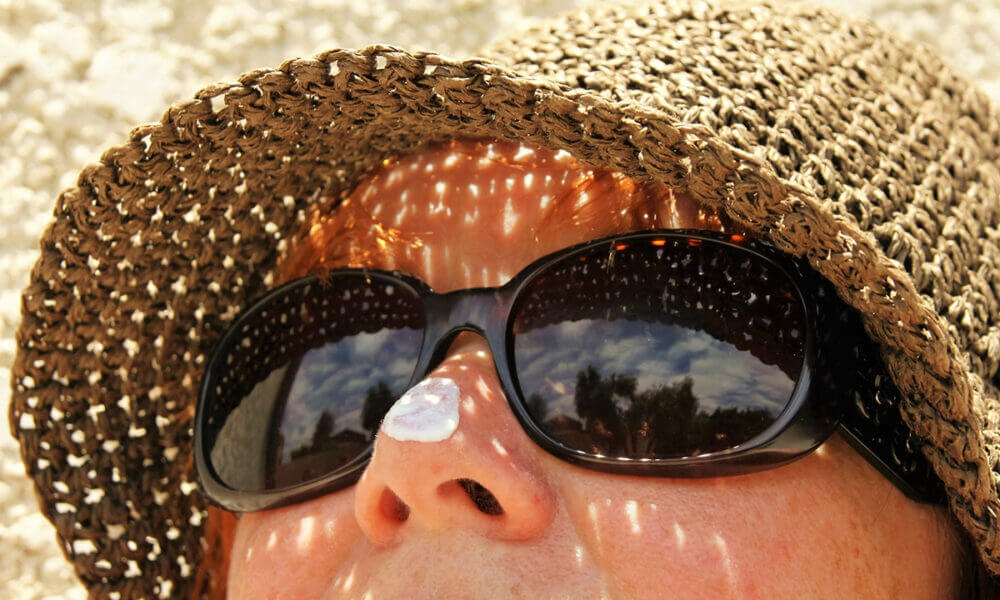Moderate sun exposure can bring significant benefits to the body and help prevent disease. However, it can be harmful in excess, even by taking special preventive measures that can sometimes cause more damage. In this sense, you should know the main negative effects that sun cream can have and use it safely .
In this way, although these protectors can help you reduce the adverse effects of the sun, they can also cause other significant problems . Among the damages they can cause, the deficiency of vitamin D, problems in the bones or alterations in the cells of the body stand out. Learn about the main negative effects that sunscreen can have and how you can avoid them!

What is a sun cream?
Sunscreen is a type of ointment specially made to protect the skin from sun damage and limit its exposure. In this way, these creams will help you avoid sunburn, as well as wrinkles or premature aging and skin cancer .
On the market you can find two types of sunscreen, physical and chemical, which can be combined to enhance their effects . Physical protectors help disperse, reflect or block ultraviolet (UVA and UVB) and visible solar rays . For their part, chemical protectors absorb these rays to prevent them from damaging the skin.
Main negative effects that sunscreen can have
Despite the benefits that sun creams offer, their use should be supervised by specialists to ensure that they are appropriate and avoid possible damage . You must bear in mind that, according to its components, there are some negative effects that sunscreen can have when using it daily.
Vitamin D deficiency
Vitamin D is one of the most important nutrients, as it helps prevent bone, muscle, and nerve problems . In the same way, it can help you improve the immune system and the body's response to external pathogens. However, the sun is an important factor, as it helps to synthesize this vitamin to meet daily requirements.
A study published in 2017 in The Journal of the American Osteopathic Association , states that the use of sunscreen can be one of the causes of vitamin D deficiency . For its part, another study published in 2019 in the British Journal of Dermatology, states that, although sunscreen does not prevent the synthesis of vitamin D, it can reduce it considerably . This is because it can block all the effects of the sun and prevent the skin from reacting to promote the synthesis of this nutrient.

Allergies
Another of the negative effects that sunscreen can have are possible allergies to its components . Although these reactions can vary according to the type of protector used, it generally affects people with sensitive skin. For this reason, if you have had allergies to other creams, it is important that you do tests in some areas of the skin. In the same way, its use should be supervised in young people (children) and the elderly , since they are usually more delicate.

Alterations in pH and cells
The various components of sun creams, when absorbed through the skin, can reach the blood and alter its composition. In this sense, a study published by JAMA Dermatology affirms that the body can maintain in the blood, up to a week, some components of body creams . In this way, reactions can be generated that affect the body's organs.
Similarly, another of the negative effects that sunscreen can have is the so-called endocrine disrupting effect that some components have . In this sense, they can generate hormonal alterations and cause diseases such as cancer, diabetes and infertility. For this reason, some types of sunscreens are not recommended either because they cause these effects, or because they are toxic or release free radicals.
In addition, some components can react with the sun and generate harmful substances when they come into contact with oxygen or other nutrients . In this way, they can alter the pH of the skin and promote premature aging, oxidative stress or toxicity in some organs.

Features to consider when purchasing a sunscreen
Although there are several negative effects that sunscreen can have, its use is recommended to avoid damage related to sun rays. For this reason, when acquiring it you must evaluate it carefully to know all its characteristics, make the most of its properties and avoid adverse effects.
- To prevent its components from reaching the blood vessels, sunscreen should not be absorbed through the skin or promote the absorption of other substances.
- It should not alter the hormones of the body , as it happens with the components with endocrine disrupting effect.
- Components toxic to any organ of the body should be avoided .
- It should not have bioaccumulative properties , as it could generate adverse effects after a period of use.
- It must be photostable to prevent rapid oxidation of the skin.
- It should not be photosensitive or cause skin allergies.
- It must be respectful with the environment and not pollute the water or be toxic to other species.

conclusion
Sunscreens are an important part of everyday life, as they help protect the skin from the damaging effects of the sun . However, despite its benefits, there are some negative effects that sunscreen can have that can affect your health.
In this sense, they can enter the bloodstream and cause poisoning , allergies or affect various organs of the body. In addition, they can alter the pH of the skin, hormones or cells, as well as release free radicals. Similarly, by having the blocking effects of the sun's rays, it can prevent the synthesis of vitamin D and affect the health of the bones .
For this reason, it is advisable to consult a dermatologist to recommend a sun cream that suits your requirements and does not affect your health. In addition, if you observe adverse effects, you should suspend its use and go to the doctor to evaluate the causes and possible damage to the body.
References
- Citroner, G. (2019, May 7). Yes, Sunscreen Chemicals Get Absorbed Into Your Blood: Is That a Health Risk? Healthline. https://www.healthline.com/health-news/how-sunscreen-chemicals-get-absorbed-into-your-skin#Study-was-limited
- Heras, L. (2014, July 29). Safe sun creams: How to choose non-toxic and environmentally friendly sunscreens . Family Medicine on the Net. Https://www.drlopezheras.com/2014/07/cremas-para-el-sol-seguras-como-elegir.html?m=1
- IBM Micromedex. (2020, July 1). Sunscreen Agent (Topical Application Route) Side Effects – Mayo Clinic . Mayo Foundation for Medical Education and Research. https://www.mayoclinic.org/drugs-supplements/sunscreen-agent-topical-application-route/side-effects/drg-20070255?p=1
- Matta, M., Zusterzeel, R., Pilli, N., Patel, V., Volpe, D., Florian, J., Oh, L., Bashaw, E., Zineh, I., Sanabria, C., Kemp, S., Godfrey, A., Adah, S., Coelho, S., Wang, J., Furlong, L., Ganley, C., Michele, T., & Strauss, D. (2019). Effect of Sunscreen Application Under Maximal Use Conditions on Plasma Concentration of Sunscreen Active Ingredients. Journal of the American Medical Association Dermatology , 321 (21), 2082. https://doi.org/10.1001/jama.2019.5586
- Pfotenhauer, K., & Shubrook, J. (2017). Vitamin D Deficiency, Its Role in Health and Disease, and Current Supplementation Recommendations. The Journal of the American Osteopathic Association , 117 (5), 301. https://doi.org/10.7556/jaoa.2017.055
- Young, A., Narbutt, J., Harrison, G., Lawrence, K., Bell, M., O'Connor, C., Olsen, P., Grys, K., Baczynska, K., Rogowski-Tylman , M., Wulf, H., Lesiak, A., & Philipsen, P. (2019). Optimal sunscreen use, during a sun holiday with a very high ultraviolet index, allows vitamin D synthesis without sunburn. British Journal of Dermatology , 181 (5), 1052-1062. https://doi.org/10.1111/bjd.17888
